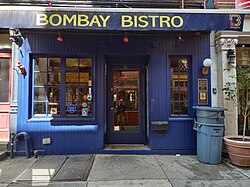 | |
|
| |
| Address | 31 Cornelia St. New York City United States |
|---|---|
| Coordinates | 40°43′52.6″N 74°00′10.5″W / 40.731278°N 74.002917°W |
| Operator | Joe Cino |
| Type | Off-Broadway theatre |
| Opened | 1958 |
| Closed | 1968 |
| Website | |
|
caffecino | |
Caffe Cino was an Off-Off-Broadway theater founded in 1958 by Joe Cino. The West Village coffeehouse, located at 31 Cornelia Street, was initially conceived as a venue for poetry, folk music, and visual art exhibitions. The plays produced at the Cino, however, became most prominent, and it is now considered the "birthplace of Off-Off-Broadway". [1]
Beginnings and early productions

Joe Cino was born into an Italian-American family, and moved from Buffalo, New York to be a dancer in New York City. After 10 years, he used his $400 in savings and opened the Caffe Cino Art Gallery. [2] Initially, Cino encouraged his friends to hang their artwork on the walls. That led to poetry readings, which led to staged readings and eventually to productions of plays. [3]
During the early days of the Cino, plays were produced on the floor. A makeshift 8x8-foot stage was later created using milk cartons and carpet remnants. Productions were initially limited to 30 minutes, and the audience could stand anywhere. The space was only 18x30-feet, and audience members often perched atop the cigarette machine. [2] Admission was one dollar, and audience members were offered a coffee and an Italian pastry along with the show. [3]
Fire and Cino's death
On Ash Wednesday, March 3, 1965, a fire destroyed the interior of the Cino. The building's structure was not affected. A new lighting system had been installed, along with the fireproofing of the Caffe's ceiling, which prevented the fire from spreading to the rest of the tenement building. [4] The official cause of the fire was a gas leak, but some suspected that Cino's lover set the fire. The community raised money by staging benefit performances while the Caffe was closed for renovations. [1] Ellen Stewart, founder of La MaMa Experimental Theatre Club, offered Cino and his staff a space to continue Caffe Cino productions on Sunday and Monday nights at her theater. [4]

Joe Cino died three days after repeatedly stabbing himself in 1967. [2]
Notable contributors
The Caffe Cino was an incubator for first-time directors, playwrights, actors, and lighting or set designers. Many continued to work in stage, screen, or both after the Cino closed. Notable contributors include: